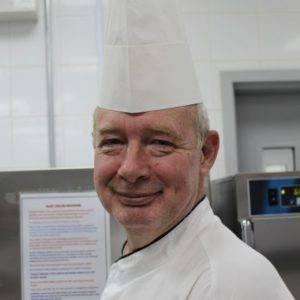Russell Clamp, cluster executive chef, DoubleTree by Hilton Riyadh admits that cultural diversity is his biggest challenge and opportunity

Describe your first ever role in the F&B industry?
My very first was when I was 13 years old as a pot washer for the kitchen in our local village pub every Sunday lunchtime. There was an Irish head chef called Dermot, and when I saw him flying around the kitchen hurling pans everywhere one minute, then turning into a funny, gentle, smiling person beaming over a beautiful plate of food the next; I thought he was one of the coolest people on the planet. Now working in Saudi Arabia at the DoubleTree Hilton Riyadh I’ve learnt quieter techniques for working alongside a colorful array of cultures, which I love.
Who has inspired you most in your career?
Alain Ducasse. After following his work and philosophies about food for many years, I got the chance to attend a chef’s table with him at Restaurant Le Louis XV. His passion for quality ingredients, and how these are reflected in the finished dish, was inspirational.
How do you view the F&B scene in the region?
In Saudi Arabia, things are moving in many directions at the same time. Concepts and food styles considered the norm in other parts of the world are only just beginning to emerge and gain acceptance here. Fast food is very popular, and historically in many Arabic cultures the quality of a meal was judged by the quantity of food presented or served. However, DoubleTree by Hilton Riyadh is beginning to see a growth in demand for á la carte options, and an appreciation of the art on the plate. This transformation is very slow but definitely on the way.
What is the biggest challenge of your role?
My biggest challenge is cultural diversity, both in terms of staff and customers. If I walked into a busy restaurant in the middle of Spain I would find a lot of Spanish people eating and a kitchen full of Spaniards cooking and this would also be the same in Melbourne or Bombay or Houston, or Beijing. But in the hotels of KSA, there is a very wide diversity both back and front of house, especially in Riyadh. Kitchen staff of different nationalities have opposing ideas of how to prepare different plates, but soon the team begin to gel and they start learning from one another. It takes time and a lot of coaching to break down all the individual perceptions and emerge with an international team behind you. This cultural diversity follows through to the customers: I must ensure I offer a range of dishes acceptable to the diverse nationalities I have staying.
What is the best aspect of your role?
Creative thinking. Taking a blank space whether that is a plate, a room or even an embassy garden and pouring my ideas all over it. The cherry on the top is when you stand back and see that space filled and admired by others.
If you could work in any restaurant in the world, which would it be?
The Waterside Inn, Bray on London’s River Thames. I would also nip over the road to do some part-time work in The Fat Duck – Heston Blumenthal’s three-Michelin-starred restaurant. However, Saudi Arabia is where the really honest food is cooked and delivered.
What tip would you share with new staff starting out in the F&B industry in the region?
A lot of young Saudis interested in entering the food and beverage industry are motivated by the opportunity to travel outside of the Kingdom, but they are daunted by the amount of learning required to cook international food. I point out to them that just mastering their own food is enough to get that ticket to travel. The further you travel from your native cooking the more valuable it becomes.
Experience:
September 2014 – present: Executive chef, Hilton Hotels, Riyadh
February 2013 – September 2014: Development chef, Spirit Group, UK
January 2011 – February 2013: Chef de cuisine, Luffenham Golf Club, UK



































































